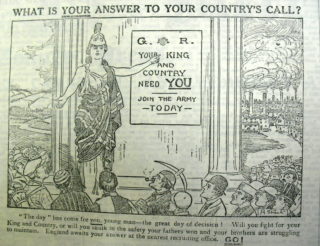
Hertfordshire Mercury, 10th October 1914
Hertfordshire Roll of Honour
By now the paper was reporting injured and dead soldiers in its Hertfordshire Roll of Honour. The first entry for Hertford in this Roll was:
Drill Sergeant Arthur M. Hill. 2nd Grenadier Guards now lies in King’s College Hospital, London after being injured in the Battle of the Aisne, 17th September, 1914. (Served in Boer Wars)
Arthur had been seriously wounded by shrapnel in the left side of his body. He had a wife and four children. He was described as being well known in Hertford as his father had been a cooper with McMullen’s and had also worked in its building department.
Army Training
Early in the month the Yeomanry was training on McMullen’s field in Port Vale (behind what is now Mill Mead School) and at Panshanger.
There was a shortage of uniforms for the men and so some were given white linen overalls and a group on the way to Panshanger, in order to drill, sang the following to the tune of “It’s a Long Way to Tipperary:
It’s the wrong way to clothe a soldier,
It’s the wrong way I know,
It’s the right way to clothe a painter,
For the people tell me so.
Good-bye territorials
Farewell RFA,
It’s the wrong way to clothe a soldier,
Aren’t my whites gay?
Support for the War Effort
£1612.17.9d collected for the War Relief commission included £19.1.4d from collecting cards and employees boxes as well as £8.11.4d from boxes in shops and inns. A further £100, making a total of £300, was given to the Soldiers’ and Sailors’ Families’ Association to be distributed to those in need.
You would be wrong to think that recycling is a modern idea. It was suggested that Boy Scouts and Church lads’ Brigades collect newspaper to be recycled.
A United Service of Intercession for the War (men only) was held at All Saints’ Church at 3.45pm on Sunday, 18th October. The retiring collection was for the National Relief Fund.
Hertford Hardware Co. made space at its premises at 16, Fore Street for a collection of old newspapers and magazines for the Belgian Clothing Fund.
The group set up by Margaret A. Smith of Goldings, to produce clothes for the troops was £55 in deficit. However she continued her work and organised a meeting for those able to help to make much needed warm shirts and socks. The shirts were already cut out and required sewing whilst wool would be supplied for the socks. The women involved would have to work at home.
British Red Cross wanted to raise £400 for a motorised ambulance for conveying the wounded to base.
The appeal for fruit for the navy had resulted in a ton of apples and pears being sent to the fleet at Dingwall, north of Inverness, Scotland.
Owen Wightman was obviously no worse for his experience of trying throughout August to get home from Austria, as he was prepared to forward plum puddings to the ships in the North Sea as part of the “Plum Puddings for Blue Jackets” campaign.
14,000 pairs of field or stalking glasses had been collected and sent to “our gallant soldiers.”
At the beginning of the war there was a wave of anti-German and Austrian feeling throughout the country. Hertfordshire Police made a large number of arrests of German and Austrian aliens aged 17 to 45 including the German Farm Colony at Libury Hill and a young man who had lived most of his life in England. Prior to the outbreak of war Libury Hall had been a German Industrial and Farm Colony for destitute and unemployed German men. It occupied 300 acres and was almost self-sufficient. It could almost be considered as a workhouse for the relief of German paupers, cf. The Settlement of Germans in Britain during the Nineteenth Century available on the internet. During the war 566 men aged 60-90 were interned there.
Belgian Refugees
A new appeal was begun on behalf of “our brave Belgian allies” with a sub-list opened to provide them with warm clothes.
Later in the month a committee was formed to deal with the placement of Belgian Refugees. Alfred Graveson was elected as honorary secretary.
On 24th October eight Belgian adults and one boy arrived and were met by the mayor and taken to 23 North Crescent by a carriage provided by Mrs. Burnet Smith and a daughter. The house had been lent by the mayor for this purpose. The refugees included Mme Van Ecke, wife of a merchant of Ypres, with her son and daughter and Mme and Mdlle Sauvage, wife of a lawyer in Charleroi. The ladies’ husbands had been taken prisoner or were dead. The house was comfortably furnished and provisioned being well lit and heated thanks to the generosity of local residents. The ladies said, “We are very comfortable here. We wish to thank everyone with all their hearts for their kindness to us.”
A further 15 Belgians from Ostend were put up at Broad Oak End thanks to the generosity of Mrs Reginald Smith. One of the refugees was a port pilot in Ostend and he had brought 88 refugees in a Government cutter designed for 15 across the channel to Dover. The trip had taken 2 nights and a day across rough seas without any food. During the trip the sail broke.
Ten Belgian soldiers were being nursed at Goldings.
Lectures
The Rev. W.D. Fenning, M.A., chaplain of Christ’s Hospital gave a lecture on “The Causes of the War” in aid of the Soldiers’ Home at St. Nicholas Hall.
The Colonial & Continental Church society held a lantern slide show with the title, “The Flag on which the Sun never sets: How we got our Empire” by Rev. C. E. Paterson at Christ Church Parish Room, Port Vale.
Education
Madam Laurence (from Watford) advertised that she “will resume classes at the (Hertford) Shire Hall on Tuesday, 6th November. New dances of the season will be taught. Schools and families visited on special terms.”
Some churches had to replace Sunday school lessons by afternoon services because of a shortage of teachers. Also elderly men were drafted into church choirs, apparently for appearance sake rather than for harmony.
An editorial note encouraged the youth of Hertford to study languages at evening continuation schools. This would allow them “to take advantage of the glorious opportunities which will be available through business and commerce after Germany is defeated.”

Cowper School at the bottom of London Road
Is this part of the reason why the attendance at evening classes at Cowper School, London Road was reported as better than in some recent years? It was considered that fees were low and within reach of the humblest. The numbers recorded for each subject were:
42 – Arithmetic; 30 – Commercial Geography (British Empire); 22 – Natural Sciences; 27 – English (with WC Edwards); 27 – French; 33 – Shorthand, elementary & advanced; 21 – Woodwork; 17 – Elementary School Teachers (Saturday)
In addition the School of Art (above the Library in Old Cross) had 34 students studying fine art; 18 studying wood carving and 9 studying art needlework.
The Mercury of 17th contained a leader on the subject of ‘Meals for School Children.’ The writer claimed that such action was likely to be expensive; smacks of Socialism and the State should not be “trespassing upon the sanctity of human life.” Meals for school children should be left to voluntary agencies.
A pamphlet entitled “Made in Hertford not in GERM-HunY” was on sale for one penny. It consisted of The Kaiser’s ABC written with his mailed fist and translated from the Germ-hun by Charles Plowman. This was probably Charles Plowman, 44, who lived with his Annie Elizabeth, his wife, and their five children at 120, Duncombe Road, Bengeo. He was described as a canvasser and advertising agent in the 1911 census. Illustrations were by Starr Wood (‘The Snark’), 34 years old, a well-known artist and charicaturist. An advert claimed it was selling like hot cakes everywhere excepting GERM-HUNY and Austria.
Entertainment and Sport
The Premier Theatre, Market Street showed a film entitled “British Army Film” which explained how the British Army was made and used. The proprietor claimed that with the variety acts added, the programme will be of “a higher standard than heretofore.”
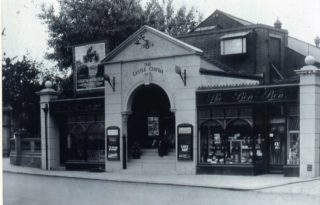
The Castle Cinema in 1914
Rival cinemas were showing different war films. From Monday to Wednesday, 19th to 21st Castle Cinema, The Wash, was showing ‘The Whirlpool of War’ which contained a close view of actual batteries firing in Belgium.
On Monday to Wednesday, 26th to 28ththe Premier Theatre showed ‘England’s Menace,’ described as “the Great British Naval Picture.” The exclusive rights to this film were obtained at a high cost. This great patriotic picture should be seen by all. It was the film of the moment showing ‘the value of England’s Naval Supremacy.’
At the same time Castle Cinema was showing for three nights only with three special matinees, “From Manger to Cross” described as ‘The World’s Greatest Picture Play.’ The manager claimed that the picture had been secured at enormous expense and was exclusive to this cinema. “Undoubtedly it is one of the greatest screen productions yet attempted. Produced in Palestine and Egypt by the Kaleen Co. and praised by over 6,000 clergymen and newspapers. Appropriate music by specially engaged orchestra. From Manger to Cross is a reverent moving picture, the Life story of Jesus of Nazareth, which everyone should see. Prices as usual – 3d., 6d., 1s., 2s.
Nelson Day, 21st was celebrated at the Corn Exchange with the singing of patriotic songs and the reading of war poems. Rev H.R. Humphreys presided & spoke on the “Hero of the Day.” Front seats at the event cost 1s and the rest were 6d.
The Hertfordshire FA abandoned all competitions due to a shortage of men. Twenty-one teams had entered the Hertfordshire League but thirteen had since withdrawn. The cup competitions were delayed until the New Year except for the Charity Cup Final. The Herts FA contributed £25 along with £36.19.4 from the clubs to the National or Local Relief Funds.
The County Chess Association having been re-established three years previously, held its AGM. Matches with a minimum of 16 boards would be played against Kent, Essex, Middlesex and Surrey throughout the winter. Hertfordshire beat Devon & Cornwall in a correspondence match over 30 boards by 17½ – 12½. Walter Turpin, headmaster of Cowbridge Elementary School, won on board 28. Other Hertford representatives were C.F Lines (board 7), a Vice President of the County Association, who lost; W. Hatton-Ward (17) who was the County Hon. Sec. & Treasurer, lost; G.W. Baker (24) won and C. A. Chapman (30) won.
Whatever else might be happening in Europe it seems that horse racing just had to continue. The Great Eastern Railway ran special trains to Newmarket for the Cesarawich Stakes on 14th and the Cambridgeshire on 28th.
Early Closing of Licenced Premises
The argument on early closure of public houses which had been rumbling on since August brought forth a letter from a “licence holder” claiming that the licence trade supplied nearly £40m yearly to the country which would maintain the Navy and “keep the shores safe.” He also asked what the religious bodies had done “in that direction.”
In response Rev. M.S. Swetman professed astonishment that anyone could take exception to this Government order.
Later in the month, “Veritas” identified the indirect costs of the national Drinks Bill as totalling £179,690,00 with lost production of labour accounting for £130m; loss by premature death £22; drink caused poverty & pauperism 15m; drink caused crime £9.8m; drink caused sickness £1.5m and drink caused lunacy £1.39m. This was to be considered along with a direct expense by the State of £160m. These amounts far outweighed the £40m gain to the exchequer. Further the Russian Government had closed down its licenced trade with a loss of £91m in revenue. There is no indication where all these figures originated.
In a letter Frederick, George Roser, landlord of the ‘Saracen’s Head’ in Ware Road, wondered if the Inland Revenue would give him a rebate since he was having to close an hour earlier. After all he had his wife and two daughters to support. Mr Roser had previously been a constable in the Metropolitan Police.
To further antagonise the licencees of public houses, clubs in the town were not closing early enough. The Justices made an order for them to close at 11 o’clock. This was still one hour later than licenced premises.
Societies
On 5th, the Hertford Literary and Debating Society held its AGM. It had 108 members. Its winter programme would include a debate on daylight saving time as well as lectures on European History by W.D. Fenning; some famous musical compositions by Father Spink and Ruskin by Mr. G.W. Baker. You could attend the whole season for 2s or a meeting for 1s or 6d.
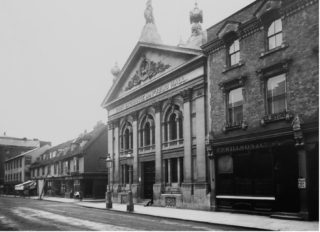
The new Corn Exchange is pictured here after the creation of Market Street, the entrance to which can be seen on the far side. The building on the right is Wilson’s wine shop.
On Tuesday, 27th at the Corn Exchange, the society held its first meeting of the season. Mr. Edward Hall, J.P., DL of the Navy league, gave a talk with the title “The Influence of the Navy in the Present Crisis” which was illustrated with lantern slides. 100 people attended the lecture.
Mr. W.D. Fenning was obviously a popular speaker at local lectures. On Monday, 5th he spoke on, “Why we are Fighting Germany and why we must Fight to the Finish.” This talk, given at the Hertford Unionist Club, was the first of a series of lectures on the subject of the war.
On Tuesday, 25th the third AGM of East Herts Women’s Suffragette Society was held at St. Andrew’s House by kind permission of Mrs. Cholmeley. Mrs. Arnold Overton, President, said that she knew members could not dissociate their minds even for a few minutes from the one all absorbing topic and she could not talk “Suffragette” even if she would. Immediately war broke out the committee decided to suspend all political activity, following the lead of the National Union and threw themselves into what help they could give in the crisis. Membership had increased from 136 to 205 with the number of Friends increasing from 294 to 398.
Hertford members were engaged in organising a Girls’ Club and they were taking over the Girls’ Friendly Social Club in a room over Messrs Rose premises in Bull Plain. When it opened it could be used from 7 – 9.30 every evening. Activities available were singing, first aid, sewing, social intercourse and possibly dancing and drill.
At a horticultural society meeting, Alfred Graveson gave a talk with “Hints from Belgium” which include such items as artificial manure, co-operation in small holdings and forestry.
Miscreants?
Two ladies from Wellington Street were convicted of stealing produce from Bengeo allotments. The maximum penalty was £20 or prison for 6 months but the ladies were actually fined £2.10s or 14 days. Even this amount may have been difficult for them to find if they were reduced to stealing from allotments.
Edward Ephgrave was given 14 days in gaol for being drunk and disorderly in the town. A fortnight previously he was charged with being an absentee and sent back to the Army Service Corps but it had no further use for him and sent him about his business.
The workhouse had 139 inmates including 19 from Hatfield. 28 vagrants had been relieved in the last fortnight.
Other Items
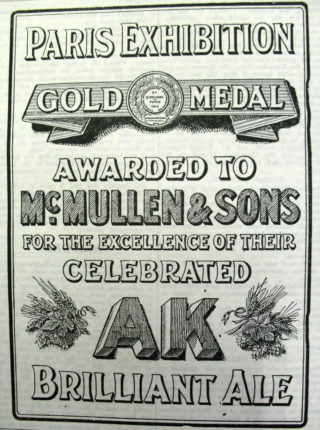
hertfordshire Mercury, 17th October 1914
Florence Barclay was a popular author who lived at Hertford Heath. Her latest novel “The Wall of Partition” published by Putnam & Sons, London, price 6d was review in the Mercury. The reviewer stated that the book failed to grip the imagination perhaps because his mind was elsewhere, i.e. the war. However he considered the book to be a clever piece of fiction characterised by literary daring and originality with a strong religious atmosphere!
Special constables who were licenced victuallers were asked to resign by the County Council. No reason was given.
Hertford County Hospital contained 51 cases of scarlet fever and two of diphtheria. The management committee agreed to install another six beds with bedding.
Men were encouraged to get their Army boots from Partridge & Webb in Fore Street, which had been established for 70 years.
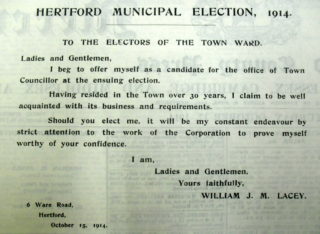
Hertfordshire Mercury, 17th October, 1914
There was due to be a municipal election with five candidates for four places but Harold Wickham received a commission in His Majesty’s Forces and so stood down. He was praised for doing this by one of the other candidates!
A tradesman suggested economising on light by closing businesses early, e.g. 9pm on Saturday, 8pm on Friday and 6.30 or 7pm earlier in the week. He also suggested having an hour for lunch and giving time for self-improvement and rifle practice.
Henry Norris & Sons, the builder, was offering 4 baths with a boiler and fittings complete.
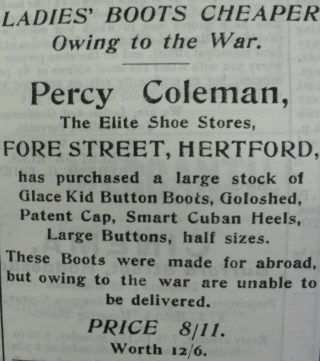
Hertfordshire Mercury, 10th October, 1914
Percy Coleman, The Elite Shoe Store, was offering ladies boots worth 12/6d for 8/11d as they could not be delivered abroad.
Mr Beckwith had received a letter from his son who was marooned still in Hamburg. The son recorded that there was plenty of food, some commodities such as tomatoes and cucumbers were plentiful as they could obviously not be exported to Britain. Colonial produce was plentiful as it was duty free. Fish was scarce. The letter contradicted a paragraph in one of the London daily papers which had claimed that the people of Hamburg were in a very bad state.
Mr. G.E. Chapman wrote a letter from Montreal stating that prospects for domestic servants were not good in Canada. This contradicted adverts which had appeared in the Mercury suggesting that there were good prospects for domestic servants in Canada.
At 9am on Sunday, 25th a Voluntary Aid Hospital was opened with 12 beds at Wallfields by the Red Cross. The building had previously housed the Sisters of the Convent of the Sacred Heart at Leahoe. By 30th the number of beds had been increased to 17 and it had 10 patients. It was intended to have at least 26 beds in the future. It was for yeomen, artillery and infantry stationed in the town. Gifts in kind, e.g. games, jig-saws, books, or money would be accepted to help run the hospital. Visiting hours were from 3pm to 6pm daily.
On Friday, 30th a Smoking Concert was held for the Herts Yeomanry at the Corn Exchange.
Bernard Ward who was a priest at St. Edmund’s College, Old Hall Green complained about the new train timetable on the Hertford East line mainly from Standon as he wanted to go to and from the College. He sent a letter to H.W. Thornton, Esq., General Manager, Great Eastern Railway, Liverpool Street a copy of which was published in the Mercury. As a result the 9:17 Buntingford to Liverpool Street train was re-instated along with an afternoon fast train from London to the Buntingford Branch Line.
All churches held their Harvest Festival Services. Not all had done so the previous year because of a poor harvest. The town mission also held one at Bircherley Green later in the month.


Add your comment about this page